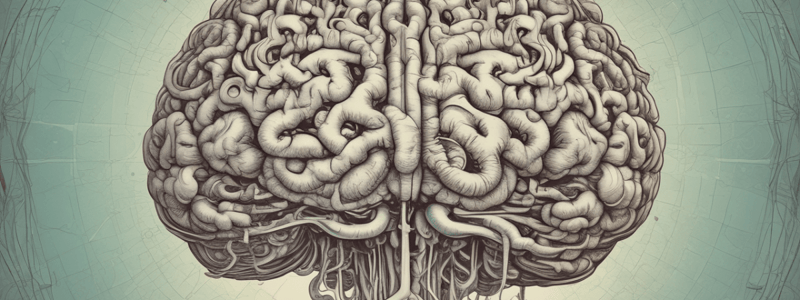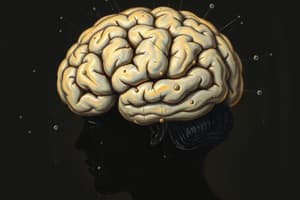Podcast
Questions and Answers
What is the main outcome of myelinization of neural axons in middle childhood?
What is the main outcome of myelinization of neural axons in middle childhood?
- Enhanced physical skills
- Decreased cognitive capacity
- Reduction in brain growth
- Formation of complex neural connections (correct)
Which of the following is NOT a characteristic of Piaget's concrete operations stage?
Which of the following is NOT a characteristic of Piaget's concrete operations stage?
- Decentration
- Reversibility
- Inductive logic
- Centration (correct)
What does the term 'horizontal decalage' suggest about children's understanding of Piaget's tasks?
What does the term 'horizontal decalage' suggest about children's understanding of Piaget's tasks?
- Children show varied mastery of tasks at different times (correct)
- All children face the same challenges simultaneously
- Children master all tasks sequentially at the same age
- Mastery of tasks occurs uniformly across all children
According to information-processing theorists, what is one improvement observed in middle childhood?
According to information-processing theorists, what is one improvement observed in middle childhood?
Which of the following types of intelligence is characterized by sensitivity to the behaviors and needs of others?
Which of the following types of intelligence is characterized by sensitivity to the behaviors and needs of others?
Which aspect of language development continues to improve during middle childhood?
Which aspect of language development continues to improve during middle childhood?
In Sternberg's theory, what does experiential intelligence refer to?
In Sternberg's theory, what does experiential intelligence refer to?
Which type of intelligence involves the ability to appreciate spatial relationships?
Which type of intelligence involves the ability to appreciate spatial relationships?
Flashcards are hidden until you start studying
Study Notes
Brain Development and Cognitive Growth
- Myelinization of neural axons enhances cognitive capacity by creating complex neural networks in the cerebral cortex.
- Growth of the frontal lobes in the cerebral cortex supports advanced cognitive functions during middle childhood.
Piaget's Concrete Operations Stage
- Decentration: Ability to consider multiple variables simultaneously.
- Reversibility: Capacity to mentally reverse physical or mental transformations.
- Inductive Logic: Reasoning from specific experiences to form general principles.
- Horizontal Decalage: Children may not master all concrete operational tasks simultaneously.
Siegler's Research Insights
- Piaget's "operations" may reflect specific problem-solving rules rather than universal cognitive processes.
Information Processing Skills
- Improvements in speed and efficiency of information processing noted during middle childhood.
- No significant age-related changes in processing capacity found among theorists.
Language Development
- Vocabulary expands significantly during middle childhood.
- Improvements seen in grammar and understanding of language's social contexts.
Gardner's Theory of Multiple Intelligences
- Linguistic: Proficient use of language.
- Logical/Mathematical: Skilled in numbers and problem-solving.
- Musical: Ability to appreciate and produce music.
- Spatial: Skill in understanding spatial relationships.
- Bodily-Kinesthetic: Coordination and awareness of physical space.
- Naturalist: Fine discrimination among plants, animals, and patterns.
- Interpersonal: Sensitivity to others' behavior and emotions.
- Intrapersonal: Deep self-understanding.
Sternberg's Intelligence Theories
- Experiential Intelligence: Ability to respond to situations based on learned experiences, fostering creative problem-solving.
- Componential Intelligence: Skill in developing effective strategies for tasks.
Goleman's Emotional Intelligence
- Emphasizes recognition and expression of one's own emotions.
- Ability to channel emotions towards achieving valuable goals is critical for maximizing intellectual potential.
Group Differences in Achievement
- No overall IQ differences between genders.
- Girls often outperform boys in tasks related to language, science, and mathematics.
Studying That Suits You
Use AI to generate personalized quizzes and flashcards to suit your learning preferences.




